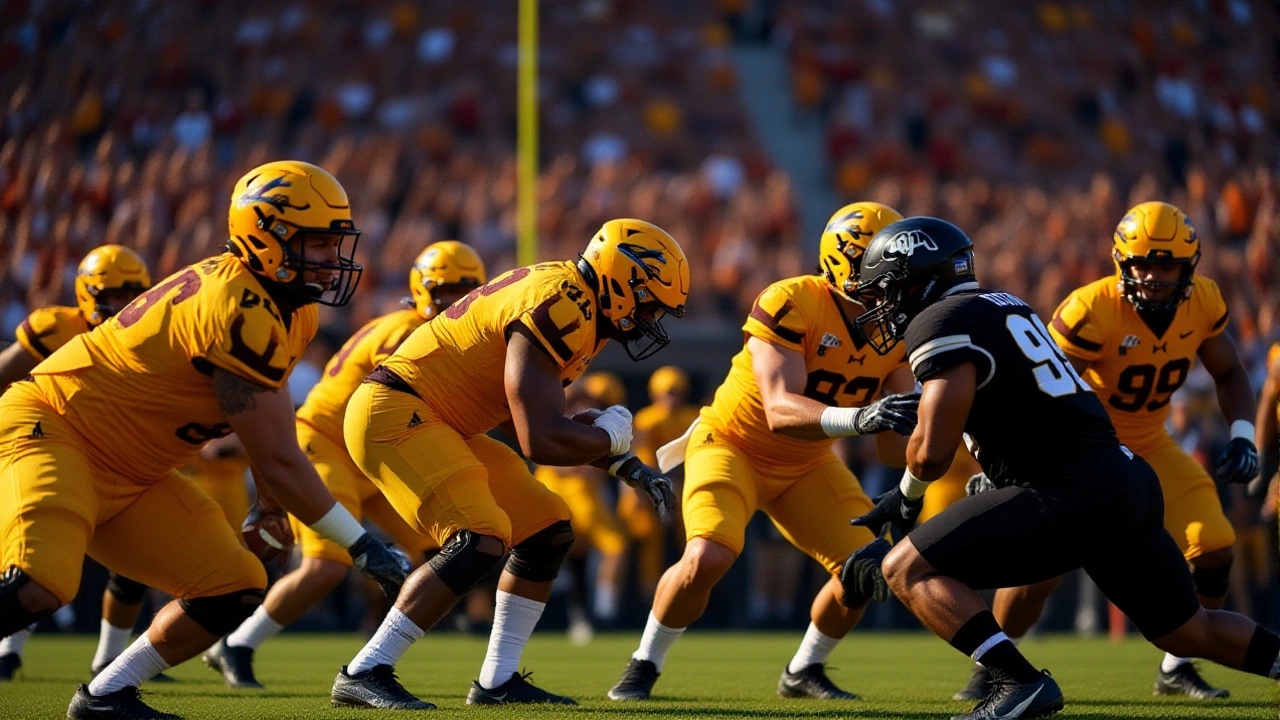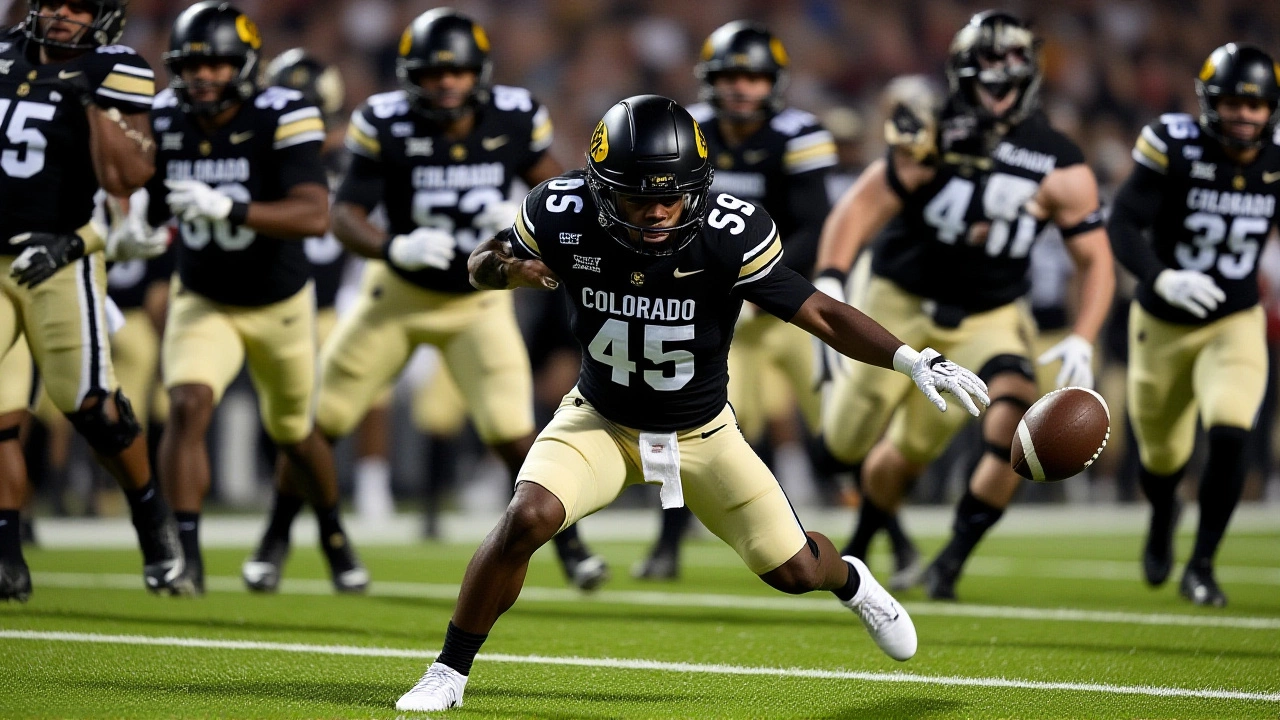The Arizona State Sun Devils didn’t just win on Saturday — they exposed cracks in a program that’s supposed to be rebuilding. On November 22, 2025, at Folsom Field in Boulder, Colorado, Arizona State rolled over the Colorado Buffaloes 42-17 in a game that felt less like a rivalry and more like a reckoning. The win lifted the Sun Devils to 8-3 overall and 6-2 in the Big 12 Conference, tying them with Utah for third place. But here’s the thing: they still need help. To reach the Big 12 Championship game Dallas, they need Texas Tech and BYU to lose — and even then, tiebreakers could still knock them out. Meanwhile, Deion Sanders, the 57-year-old head coach of Colorado, stood on the sideline in silence as his team collapsed in the fourth quarter — for the fourth time this season.
Turnovers, Tush Push, and a Fourth Quarter Collapse
Arizona State’s offense was sloppy for three quarters. Quarterback Jeff Sims threw an interception at his own 9-yard line. Running back Raleek Brown fumbled trying to leap over a defender. They had 13 points at halftime, despite outgaining Colorado by nearly 150 yards. It was a mess. But the defense — that’s what kept them alive. The Sun Devils forced three-and-outs. They stuffed the run. They made Colorado’s offense look confused, disjointed, out of sync. Then came the fourth quarter. And everything changed. Kanye Udoh burst through the line for a 22-yard touchdown on a six-play, 74-yard drive that turned a 13-17 deficit into a 35-17 lead. The crowd in Boulder went quiet. The Buffaloes’ offense never recovered. Colorado’s defense, which had looked sharp early, suddenly looked like a team that had given up. Three straight punts. No points. No hope.Deion Sanders’ Unspoken Crisis
This was Colorado’s fourth straight Big 12 loss. Third blowout. And Deion Sanders, once hailed as the savior who could bring swagger back to Boulder, now faces mounting pressure. His record at Colorado? 16 wins, 20 losses. The program hasn’t won a conference title since 2005. The fans? They’re tired. The players? They’re confused. After the game, Sanders told reporters he’d make changes — but wouldn’t say what. "It represents another comment focused on his return for next season," CBS Sports reported. Translation: he’s staying. But what’s different? The offense? The play-calling? The culture? He didn’t say. What he couldn’t ignore was the backlash on social media and the DNVR Postgame Show. The analysts there tore into his decision to use the "tush push" — a short-yardage sneak where the quarterback is shoved forward by linemen — with his own son, 18-year-old quarterback Shedeur Sanders, who’s 6-foot-1 and 196 pounds. "You go tush push with your quarterback who’s obviously undersized at this point," one commentator said. "And you’re not even just running tush push. You’re just running no-huddle tush. Like not even a second thought about it. I was in shock, bro. That was the worst thing I’ve seen all year." It wasn’t just the play. It was the context. Shedeur isn’t a power runner. He’s a passer. A dual-threat. And here’s his dad, in a must-win game, turning him into a human battering ram with no backup plan.
Arizona State’s Narrow Path to Glory
For Arizona State, this win was a lifeline. They’re not out of the race — but they’re dangling by a thread. If Texas Tech loses to Oklahoma State and BYU falls to Utah, then the Sun Devils could sneak in. But they’d need to win their final game against Arizona — and hope the tiebreakers favor them. They’ve got the talent. They’ve got the momentum. But they’ve also got the ghosts of their own mistakes: four turnovers, three red zone failures, and a first-half performance that should’ve cost them the game. Head coach Kenny Dillingham didn’t celebrate wildly. He knew what was at stake. "We’re not done," he said. "But we’re not out of the woods either."The Bigger Picture: What This Loss Means for Colorado
This isn’t just about one game. It’s about identity. Colorado hired Deion Sanders to bring energy, recruiting clout, and national attention. He delivered the first two. But wins? They’ve been elusive. The offense is inconsistent. The defense is porous. And now, with the 2026 season looming, players are asking questions. Who’s calling the plays? Why are we running the same stuff in critical moments? Why does it feel like we’re playing for a highlight reel instead of a championship? The NCAA is watching. Recruits are watching. And the Big 12 — a conference that’s trying to rebuild its credibility — is watching too. Colorado’s struggles aren’t just a local story. They’re a warning sign.
What’s Next? The Final Week and Beyond
Arizona State closes the regular season at home against rival Arizona on November 29. Win that, and they’ll be in the conversation. Lose, and their season ends with a whimper. Colorado, meanwhile, heads to Fort Collins to face Colorado State in the Rocky Mountain Showdown. It’s a game they should win — but after four straight losses, you can’t assume anything anymore. Deion Sanders says he’ll make changes. But change without a plan is just noise. The real test comes in January, when recruiting begins and the staff has to rebuild trust — not just with fans, but with the players on the field.Frequently Asked Questions
Can Arizona State still make the Big 12 Championship game?
Yes — but only if Texas Tech loses to Oklahoma State and BYU loses to Utah, and Arizona State beats Arizona in their final game. Even then, tiebreakers matter. Arizona State currently holds the head-to-head tiebreaker over Utah, but if both teams finish 7-2, BYU and Texas Tech would still be ahead. Their path is narrow, but mathematically alive.
Why is Deion Sanders still coaching Colorado after four straight losses?
Despite the losses, Sanders brings unmatched recruiting value and media attention. He’s landed top-10 classes in two years, including elite dual-threat QB Shedeur Sanders. Athletic director Rick George has publicly backed him, citing long-term vision over short-term results. But with season ticket sales dropping and fan frustration rising, pressure is mounting for tangible improvement in 2026.
What’s the controversy around the "tush push" with Shedeur Sanders?
The criticism centers on using Shedeur — a 6-foot-1, 196-pound passer — in a power-running play designed for bigger, physical QBs. Analysts argue it’s risky, unnecessary, and shows poor game management. With Colorado down by 10 and needing a spark, the play offered zero upside and maximum injury risk. The fact that it was called in a no-huddle, high-pressure situation made it even more questionable.
How did Arizona State’s defense turn the game around?
After allowing 17 points in the first three quarters, Arizona State’s defense tightened up dramatically in the fourth. They shifted to a more aggressive nickel package, blitzed on third downs, and forced three consecutive three-and-outs. Linebacker Jalen Harris had two key stops, and safety Kellen Moore intercepted a pass that sealed the game. Their discipline in the final 15 minutes was the difference.
What’s the impact on the Big 12’s playoff chances?
With Texas Tech and BYU still in contention, the Big 12’s best hope for a College Football Playoff spot now rests on one of those teams winning the conference. Arizona State’s win doesn’t help that cause — but Colorado’s continued struggles hurt the league’s overall strength of schedule perception. The Big 12 needs a champion with a top-10 resume to even be considered.
Is this the end of the Deion Sanders era at Colorado?
Not yet. Sanders has a contract through 2028 and has delivered on recruiting and branding. But if Colorado finishes 2025 with a losing record — and doesn’t show clear offensive improvement — the pressure will become unbearable. The next 12 months will determine whether he’s a transformative coach or a flashy distraction.
